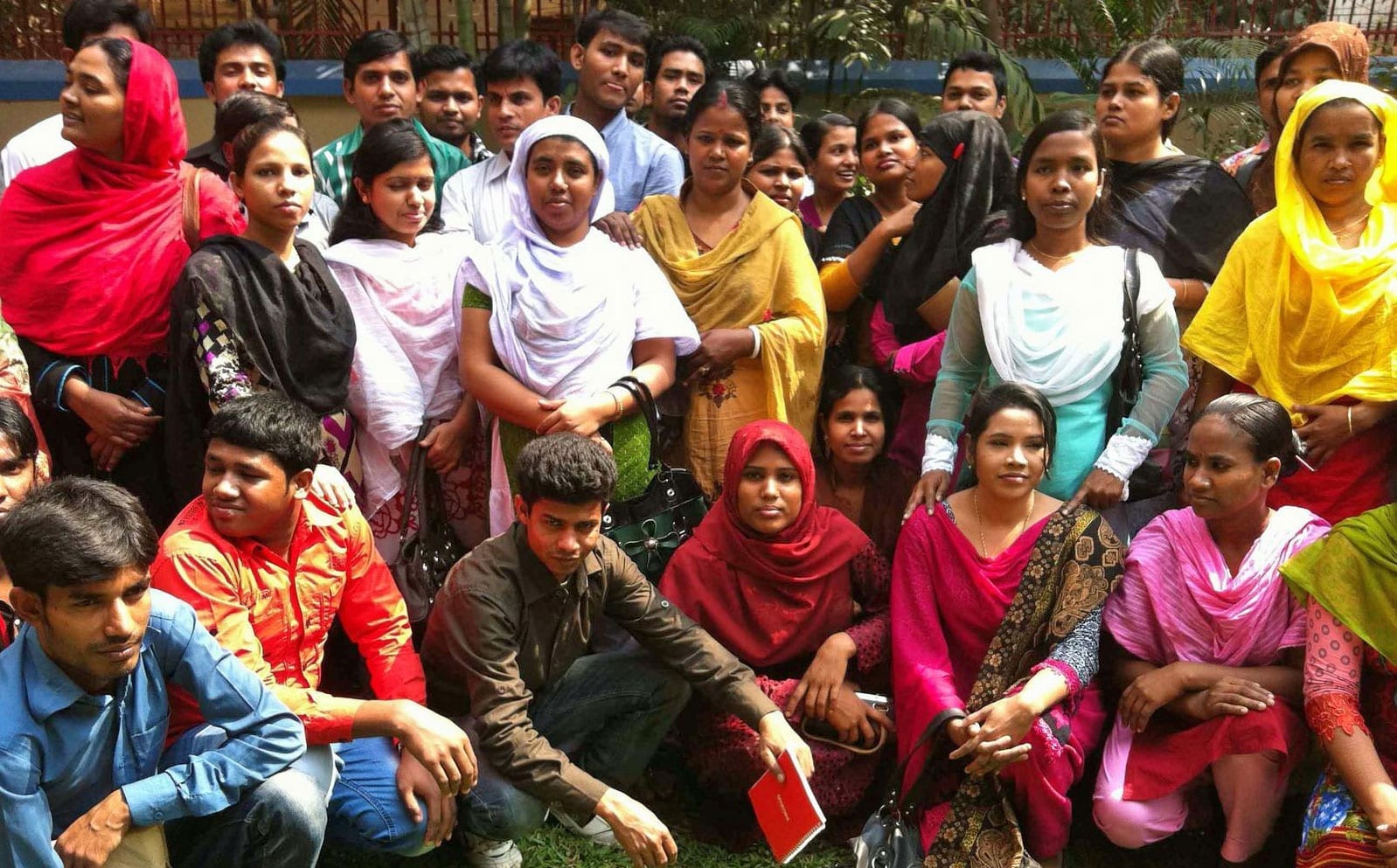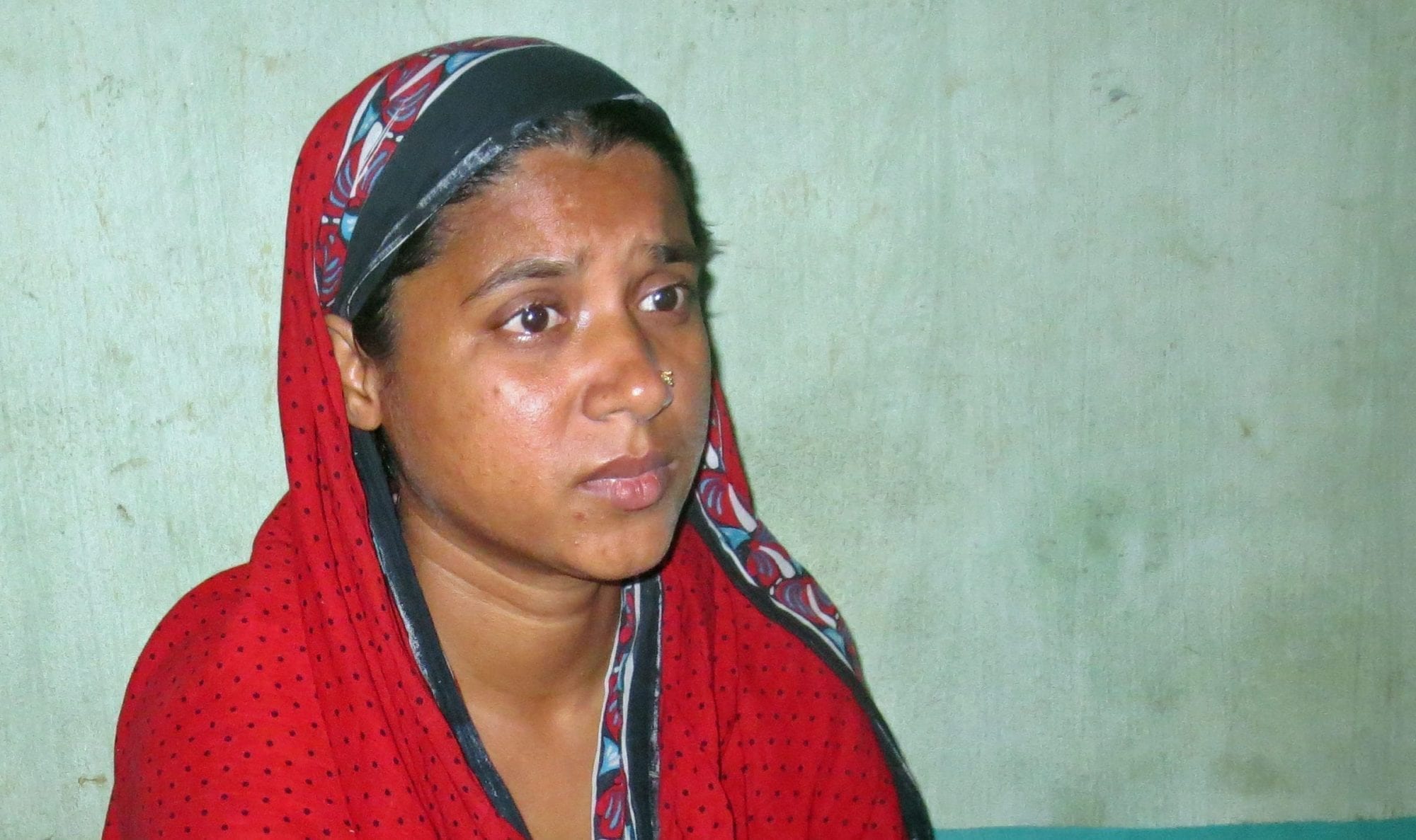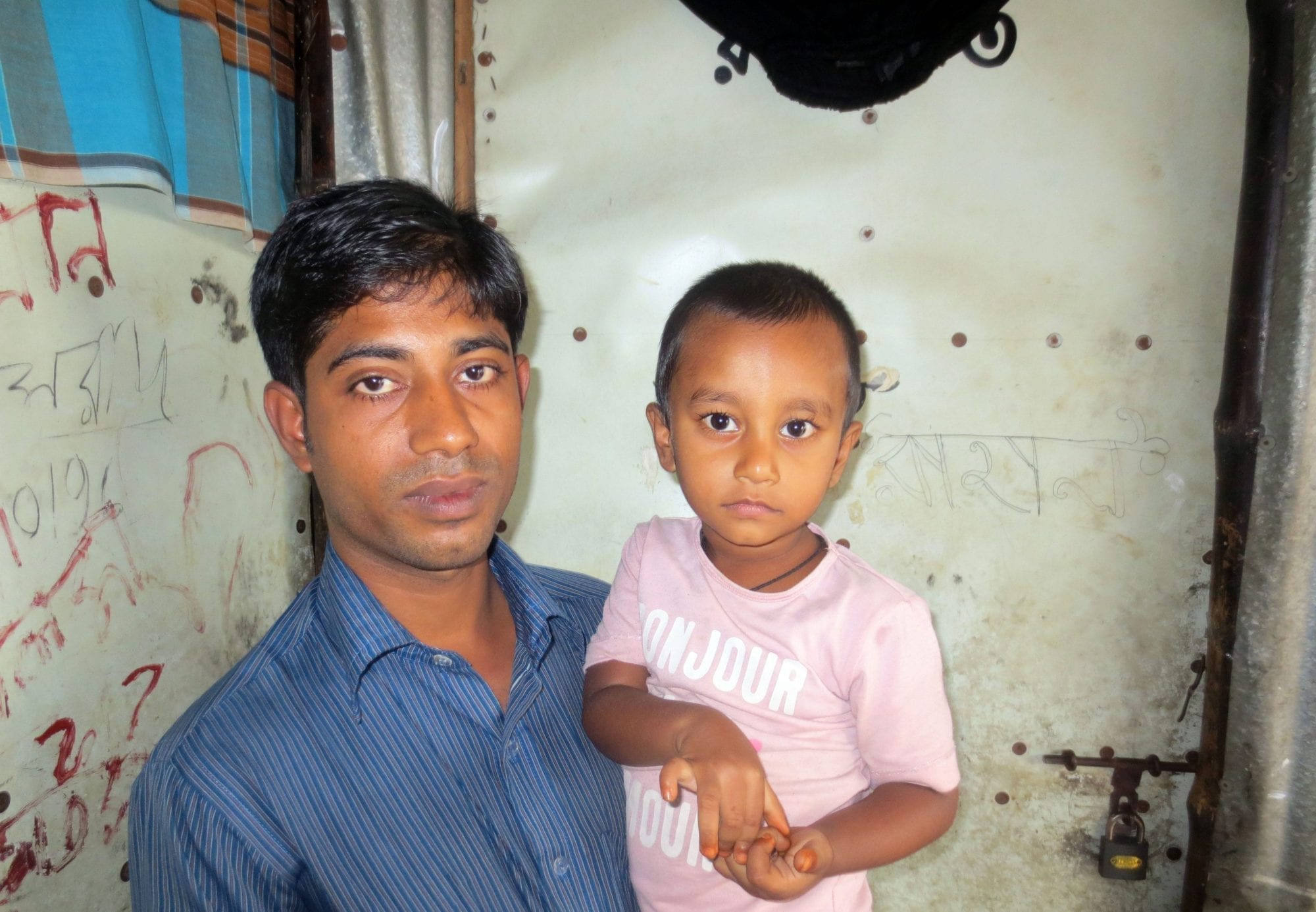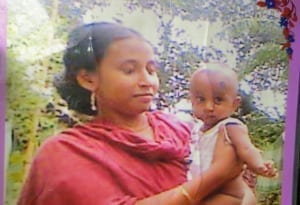
Feb 25, 2014
A Bangladesh garment worker leader and four union organizers, among them two women, were badly injured Saturday when about two dozen people beat, kicked and threw them to the ground as the five were speaking to workers in the dormitory where they live. One of the organizers was taken from the scene, beaten severely and dumped, unconscious, nearby. He and a female organizer remain in the hospital. The whereabouts of the garment worker are unknown.
According to several witnesses, the attack was carried out by factory managers and other men and women, some of them who worked for the factory, potentially paid to carry out the act—not an uncommon practice in the country. The women in the group were separated from the others and threatened with rape.
The organizers, all working with the Bangladesh Federation of Workers Solidarity, were supporting workers who had earlier approached the union for assistance and who had been fighting to be paid the minimum wage at their factory. The factory, which manufactures for Western brands, employs approximately 4,500 workers—many of who had staged a wage protest February 18, which was ultimately put down by police.
On Saturday, the organizers and activists from the factory floor signed up about 300 workers for a union before the attack occurred—though all the signed authorization cards were stolen during the assault.
Workers, activists and the Solidarity Center are calling for a thorough and vigorous investigation into the crime that brings the perpetrators to justice and shows that Bangladesh is unwilling to tolerate attacks on workers’ right to freedom of association.
The Solidarity Center is providing legal assistance and support for medical expenses for the injured organizers, and partners with the Bangladesh Federation of Workers Solidarity.
Feb 18, 2014
Garment workers and workers in other industries in Bangladesh’s export-processing zones are subject to a different, much weaker set of labor laws than workers in the rest of the country, and the government must take steps to reform laws so they meet international standards for freedom of association and collective bargaining rights, said A. K. M. Nasim, senior legal counselor at the Solidarity Center’s office in Dhaka, the Bangladesh capital. Further, “if we have any half-hearted reform in the legislation, it will mean that the workers will have to continue their struggle for a period of at least a generation to achieve these fundamental rights.”
Speaking at a recent forum in Washington, D.C., Nasim gave an overview of the current labor rights environment for Bangladeshis and provided key recommendations for improving their wages and working conditions.
Some 377,600 workers, the vast majority women, work in eight export-processing zones (EPZs) throughout the country.
Bangladesh derives 20 percent of its income from exports created in the EPZs, which are industrial areas that offer special incentives to foreign investors like low taxes, lax environmental regulations and low labor costs.
Yet while workers outside the EPZs are permitted to form trade unions, EPZ workers must form weaker workers’ welfare associations. Even though the associations have the right to bargain and negotiate agreements with employers, in practice, employers do not let the workers form their associations easily. Leaders of workers’ associations who actively promote the interests of the employees “have been fired from their jobs,” Nasim said. “As a result, most of the workers’ associations in the EPZs remain in existence only on paper.”
Nasim discussed the decision last June by the U.S. government to suspend Bangladesh’s trade benefits based on the country’s chronic and severe labor rights violations. The United States suspended its Generalized System of Preferences (GSP) agreement with Bangladesh after 112 workers were killed in a 2012 fire at the Tazreen garment factory, and more than 1,100 died last April when the Rana Plaza building collapsed. Since the GSP suspension, the Bangladesh government has allowed some 100 unions to register, in contrast with the few unions recognized prior to last year.
The Rana Plaza disaster also led to the Accord on Fire and Building Safety in Bangladesh, a five-year binding agreement between international labor organizations, non-governmental organizations (NGOs) and retailers in the textile industry to maintain minimum safety standards. The tragedies also have generated an increase in NGO involvement, and Nasim urged the NGOs working to improve workplace safety and health to support workers in forming and running unions, and making sure they are sustainable in the long run.
Also speaking at the forum, Solidarity Center Asia Regional Director Tim Ryan showed how the economic and political intersect in the Bangladesh context as described by Nasim.
“Bangladesh is a crucible for the intersection of globalization, the government’s economic policies, how these impact on the development of a democratic culture in civil society, and equitable and just economic growth that benefits workers and their families,” Ryan said. “A voice for workers in this process is absolutely crucial for growing democracy and democratic organizations in Bangladesh.”
The forum, “Strengthening Democratic Practices in Bangladesh: Empowering Workers in Export Processing Zones,” was sponsored by the National Endowment for Democracy and included Zerxes Spencer from the International Forum for Democratic Studies as moderator.
Nov 25, 2013
A year ago, 112 garment workers were killed in a fire at the Tazreen Fashions Ltd. factory—and a thousand others were injured in the scramble to escape a building with no fire escapes and firmly barred windows.
On April 24, 2012, more than 1,200 garment workers were killed when the multistory Rana Plaza building pancaked in, crushing workers in five factories located in the building.
If these workers, nearly all young women, had been in unions, it’s likely these tragedies could have been prevented.
These disasters—and many more smaller, little-reported workplace tragedies—are why Bangladeshi garment workers are literally organizing for their lives.
Because of the international attention these disasters sparked, workers now can register their unions.
But they are facing intense employer resistance—including physical attacks, threats and termination—and some of these young leaders could benefit from hearing from experienced trade unionists that the fight for a union is worth the struggle.
The workers would be strengthened by international support, knowing they are not alone. To send them a messae of solidarity, please use the sample letter below or write one of your own. Send the completed letter to [email protected] and let these workers know that you stand with them. The Solidarity Center, which has worked for 20 years to help Bangladeshi garment workers gain a voice on the job, will translate and distribute the letter to its union partners, and your message will reach the workers who need to hear it the most.
_____________________________________________________________
SAMPLE LETTER
Dear Sisters and Brothers:
As fellow trade unionists, we are writing in solidarity to commend your bravery and to encourage you to stand together in the face of employer resistance.
Since the tragic Tazreen factory fire in November 2012, you have made great progress in your efforts to organize. Even though ready-made-garment factory owners and the Bangladesh government have placed hurdles and difficulties in your path, you have persevered.
As union members, we know what this struggle is like. We know how hard employers fight to keep the union out, going as far as harassing and firing activists and leaders. Employers will try and turn you against one another.
We know from experience the struggle is worth the difficult journey—the union is the best way for workers to stand up for their rights.
Keep up your amazing effort and find strength in each other. Do not give up! We are with you!
In Solidarity,

Nov 25, 2013
Tahera, 23, has been so ill from the injuries she sustained in the November 24, 2012, Tazreen Fashions factory fire, her husband Roshidul has had to quit his job to take care of her. Now, they have no income to support their family of four.
The blaze, which spread through the multistory factory outside Dhaka, the Bangladesh capital, killed 112 workers and injured thousands more. Like nearly all Tazreen survivors, Tahera jumped out of a window to escape the flames because the stairwells were locked.
“I have severe pain in my whole body,” Tahera said, crying. “I don’t feel any strength in my body now. Although one year has been passed, I can’t sleep properly because of fear. I try to forget the memory of the Tazreen’s fire accident, but I can’t. Sometimes it seems to me that I will not live any longer.”
Her physical injuries are severe, as are her mental and psychological suffering. As panicked workers broke windows and ripped open air shafts to escape the building, the electricity went out while the blaze spread. Tahera fell in the melee, and her head and chest were trampled.
“Following the fire accident, Tahera behaved abnormally,” says Roshidul. “She used to try to leave the house all the time, even at night. I used to sleep in front of the door of house so that she could not wander out. Following the accident at Rana Plaza, she used to cry loudly watching those scenes on television and, even one year after the accident, whenever my wife watches any scene of fire on television she becomes so scared she cries.” In the Rana Plaza disaster, more than 1,200 garment workers were killed April 24, 2013, after the multistory building housing five garment factories near Dhaka collapsed.
“Even now, I can’t remember any one’s name, sometimes nothing,” Tahera said.
Tahera and her husband are borrowing from shopkeepers to survive and do not know how they will pay rent for their home in Savar, near Dhaka. “Our present financial condition is very poor, which it was not before the accident,” said Tahera. They have a 14-year-old daughter and 2-year-old son, but Tahera says, “I can’t pay the tuition fees of my daughter, I can’t buy milk for my little son and I can’t remember anything.”
Roshidul said nearly all of the money they received for Tahera’s injuries from the Bangladesh Garment Manufacturing and Exporting Association (BGMEA) was spent on her medical care. He also used up his savings for her treatment. Now, there is no money left. “I haven’t been able to take her to the doctor or buy medicine for her treatment for the last two months,” he said. Tahera and her husband say families like theirs have been forgotten.
Tahera came to Dhaka nine years ago, hoping to better her life. Now, all she wants is enough support to get medical treatment and ensure her family has a place to live and food to eat.

Nov 22, 2013

Mahfuza Khatun, 22, died in the Tazreen Fashions factory fire. Photo courtesy Md. Abdul
To mark the one-year anniversary of the deadly Tazreen Fashions factory fire in Bangladesh, the Solidarity Center is highlighting stories of survivors and their families.
Mahfuza Khatun, 22, was a sewing machine operator on the fourth floor of the Tazreen Fashions garment factory when the multistory building went up in flames just outside Dhaka, the Bangladesh capital. Some 112 garment workers were killed in the November 24, 2012, tragedy, and Mahfuza was among them, although her body has never been found.
“I did everything to find her dead body. Unfortunately, all my efforts were in vain,” said Md. Abdul, Mahfuza’s husband.
Abdul and his 2-year-old son live with his parents and Abdul’s three siblings. As the eldest son, he must provide nearly all the financial support for his extended family.
“The family used to be supported by the income of me and my wife,” said Abdul, also a garment worker. Now, his income alone cannot cover all the family’s costs. As a result, he said, “My son often becomes sick, and I cannot take him to the doctor for lack of money.”
Mahfuza came to Dhaka in 2009 with her husband. “Despite her desire to continue to study, she started working to financially support my family. Until the last day of her job, she never spent a single penny outside of this family,” he said.
“On November 24, 2012, it was lunch time when I talked to her for the last time. In the evening, I heard about the fire at Tazreen Fashions and rushed to see my wife. I looked for my beloved wife in every nook and corner but could not find a trace of her.” His sister-in-law also was burned to death at Tazreen. Workers who escaped the blaze did so by jumping out windows because nearly all the stairwell doors were locked.
Neither Abdul nor his son have received any compensation on behalf of Mahfuza—with the exception of $25.64 he got from the Bangladesh Garment Manufacturers and Exporters Association. He spent nearly all his savings looking for her body. Property he owned near Tazreen was destroyed in the blaze and now, Abdul says, “I do not have anything for the future of my son.”
Survivors and the families of those injured or killed are still suffering a year after the Tazreen blaze, and no one has stepped up to help them survive the devastating financial and emotional loss. “I urge the government to behave responsibly and arrange security for every single citizen,” Abdul said. He seeks “enough compensation from BGMEA and the factory owner so that I can survive and educate my son.”
Survival is one of many struggles Abdul faces. “What will I say when my son asks about his mother?” he asked. “I will not even be able to show her grave to her son.”




